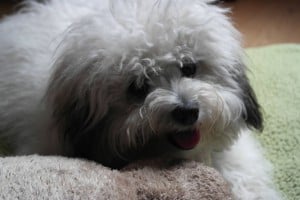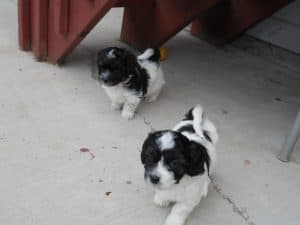One of the many designer dog breeds is the Biton, having the Coton de Tulear and the Bichon Frise breeds as parents that have been passed on to this breed are friendliness, alertness, gentility and its representatives are particularly active.
The Bitons fit very well in apartments from a lifestyle point of view. They only require moderate physical exercise to burn excess energy. If you don’t have the time to go out with your dog or spend at least a few hours a day with him at home, you might want to consider another type of dog.
Overall, the Bitons are dogs that can be suitable for a lot of people, with different lifestyles. Given the low requirements for grooming, high trainability, socializing skills, watchdog abilities, and excellent companions for kids and other dogs, it is fair to say that they can adapt to owners with several different personalities. It is now down to each potential owner to assess if these traits are the ones they are actually looking for in a dog.
Bitons can reach up to 9-11.5 inches tall and weigh anywhere between 8 and 18 pounds. You should also keep in mind that those dogs can leave a long life which means you are in for a lot of commitment. The Biton can live anywhere between 14 and 19 years.
The typical Biton is smaller than medium size and it can brighten your whole home up with its adorable and quirky personality.
Quick: Biton Dog Breed – Pros & Cons
Despite their size, those dogs make excellent watchdogs. They will alert you the moment someone approaches your home. This makes them excellent family dogs and they thrive in a household with as many family members as possible.
They are intelligent, energetic, friendly, adorable, and very protective of their family. They are also small enough for your kid to walk them under adult supervision.
Bitons have a lot of hair but are not heavy shedders. This means you will have to either invest in a professional groomer or take the time to do it yourself.
Pros
- Intelligent
- Smaller size
- Great watchdogs
- Very friendly
- Easy to train
Cons
- Bitons also take their territorial instinct of the Bichon Frise, which means you might have a hard time potty training them.
- Their coat requires daily grooming.
Temperament
The Bitons have good socialization skills, allowing them to get along very well with other dogs and children, also being very suitable as companion dogs for families. Disregarding the size, they do have some good watchdog skills.
The Bitons are very pleasant personalities, being very friendly and affectionate, but also pretty energetic. They enjoy activities and being at the center of attention. They get along well with children and other dogs and they can be considered a gentle breed.
Bitons can be some of the sweetest creatures in the world. They are also widely used as special dogs for people with special needs, including the blind. Those dogs are very intelligent and have the capability to adapt to almost any owner.
Is a Biton good with children?
The playful personality of the Biton and its smaller size make it an excellent playmate for your child. They can be very gentle and you will often see them in the backyard playing and tiring each other out.
As your kids grow older, it’s very important to teach them the proper way of treating a dog. They are never aggressive towards family members and the worst thing you will see from them is a warning bark when the child plays too roughly.
If you don’t have children, it’s best to take them to the park and let the dog interact with as many children as possible. Bitons can be very territorial and might be aggressive towards children who may come to visit you. Proper socialization is important.
Behavior towards strangers
As mentioned before, Bitons are very territorial and will consider any stranger a threat to you and your home. This is why they are known to be great watchdogs despite their adorable and fluffy look. But you should keep in mind that this also makes them a bit dangerous to strangers.
If you want a Biton to be as playful with visitors as it is with your family, you will have to introduce him to as many strangers as possible from an early age. This will ensure that you will have a friendly adult dog.
If you can’t, or don’t want to socialize with him, make sure you have a space in or outside your home where he can stay while you have visitors, especially children. You can make an older dog just as friendly but you will need a lot of time and patience.
How it does with other pets/dogs
Its playful personality also makes it a social butterfly when you take him to the dog park. They will even love having another pet in the house they can play with. If you play on raising him with other pets, make sure you introduce them properly and separate them immediately if they get in a fight.
If you don’t have another pet, you can take him to the dog park and let him interact with other owners. You should also take into consideration their territorial behavior and make sure they don’t get aggressive when you introduce a new pet to your home.
They are very intelligent and they will quickly understand that the new pet is not a threat and will befriend him in a short amount of time.
Aggressiveness of a Biton Mix
Bitons are incredibly adorable and you will often compare them with little clouds as they can be very fluffy as well. But don’t let this fool you as they can be quite aggressive as well if they feel like their family is threatened.
You can easily solve their potentially aggressive behavior by socializing them properly. If you don’t have the time to introduce him to lots of new people while the dog is young, you might want to either opt for another dog or postpone getting a Biton.
It’s important to spend as much time as possible with your dog while it’s young so it can learn how to behave.
Does it bark a lot?
Another thing you should keep in mind that Bitons are very vocal dogs. In fact, you will have to train them to bark less. They tend to get spooked by most sounds they hear outside and will immediately bark to let you know of the potential danger.
Bitons also have the habit of responding to other dogs’ barks. This means that if you already have neighbors’ mouthy dogs, your Biton might constantly bark at them. If barking bothers you or your neighbors, you might want to think twice before getting those adorable dogs.
You might be able to find a training program you can take them to so they can learn to control their barks. Persistent training has proved to be an effective way of teaching them to bark less.
Appearance and Grooming
The Bitons don’t shed too much in general, but this doesn’t mean that grooming activities are not required. These are recommended in order to maintain the good looks of the coat, as well as its cleanliness.
Baths are only required from time to time and it is advisable to use a hypoallergenic soap in order to prevent irritations or occurrence of allergies at skin level. They are generally easy to care of.
How big does it get?
Bitons can get as tall as 9-11.5 inches and they can weigh anywhere between 8 to 18 pounds. They are not big dogs and they don’t require a lot of space. You won’t have to worry about them kicking things down if you have a more cluttered apartment.
Their size also makes them excellent for apartments if your place is properly soundproofed. They will also fit perfectly next to you on the couch. Bitons love attention and will always follow you around the house, and their size won’t make it a problem.
What does a Biton look like?
When it comes to crossbreeds, the way the puppy will look can be quite unpredictable. They can easily look a lot like the parents and have the entire personality of the other. But one thing you can be sure of, your Biton will have a lot of hair.
Bitons have a sturdy and well-proportioned body. Their head is round and their eyes are usually dark and quite round as well. They always have short snouts and black noses, while their ears hang down the sides of the head.
Appearance and color
Usually, the dogs in this breed are solid white which is also the preferred color, but they can also come in apricot or gray at times. The coat is pretty thick but fluffy and very soft at the touch.
The coat coloring from the Bichon side of the parents is white, the Bichons sometimes having some apricot shades on the ears. On the other hand, the Cotons can come as a single, two, or even tri-colored dog, with the main colors being either white or black.
The coat aspect is curly for Bichons and wavy or even straight for Cotons, but both are soft at the touch. Both parent breeds are low shedders and are hypoallergenic, which makes them good choices for people with allergies.
Type of coat
The best way to tell which parent the Biton takes after is to check out their coat. If it takes after the Bichon Frise, their hair can be quite thick and very fluffy. If it takes after Coton de Tulear, its coat will be long, smooth, and either straight or curly.
The coat doesn’t typically get tangled but it’s always a good idea to brush it at least once a week. And you also have the option of taking it to a professional groomer that can cut off their excessive hair. This will make taking care of the Biton’s coat a lot easier and you only have to go back for hair clipping once a month.
How easy it is to groom?
Brushing is required from time to time, to prevent the formation of mats from the fallen hairs. Professional grooming may be a good choice for these dogs, as this helps ensure healthy and good looking coats for the dogs and less trouble for the owners in the periods when they shed.
The Bichon Frise parent is known to have problems with gum infection. This means you will have to be careful about what your Biton eats and wash his teeth regularly. Nail clipping should be done carefully and about once a month.
Bitons also have floppy ears, which means that you need to check them regularly and make sure they are clean and healthy. This will ensure that your dog doesn’t have an ear infection or ear mites.
Biton Care Guide – Diet, Exercise & Health Issues
The Coton de Tulear breed is considered to be rare, although it has gained a lot of popularity lately. Their pleasant personalities, fun and easy–going at the same time makes them good candidates for companionship. Besides this, they are also very adorable and cute in look. With regards to health, the Bitons do very well, as there are very few genetic issues with the parent breeds.
However, there is a concern that the popularity they gained lately may increase the chances of illnesses, so it requires thorough research before getting such a dog. But, once one gets a Biton, one will enjoy all the adorable qualities and looks of this sweet Biton, along with a good friend and companion.
Diet Tips: What does it eat?
Bitons don’t have any special dietary needs, high-protein dog food that’s made for small dogs should be perfect. It’s always recommended to talk with your vet about each change in the dog’s diet. You should keep in mind that they are more prone to gaining weight since they are smaller than other breeds.
It’s also not recommended to give your dog table food as it often contains unhealthy condiments and ingredients for your dog. Bitons are excellent at charming their owners but you should only give them food that’s been specifically made for them.
Exercise Requirements: Keeping the dog in shape
Those dogs are quite active but don’t need a huge backyard to live happily. A few short walks a day is more than enough for them to consume their excessive energy. They often prefer playing with kids, other dogs, or their owners than playing with toys.
Providing your dog with toys is still necessary so they don’t get bored and start destructing your home. Bitons should have some mental stimulation as well since they take the love of performing from their Bichon Frise parent.
Common Health Issues for a Biton
Getting a hybrid always doubles the chance of getting a sick dog. This is because the crossbreeding result will be prone to both types of diseases that the parents are known for. You should always take your dog for their vet visits and annual blood tests.
Some serious conditions that you might have to deal with are spinal dis disease, liver disease, pancreatitis, blood-clothing disease, arthritis, diabetes, hypothyroidism, and heart disease. They are not very common but it’s something you should be aware of, especially since Bitons live up to 20 years.
Other minor conditions are luxating patella, eye problems, deafness, urinary stones, urinary tract infections, gastrointestinal issues, skin allergies, hip dysplasia. You should also be careful about blotting and use a slow feeder if your dog seems to eat too fast.
Training a Biton
Like any other intelligent dog breed, the Bitons are very trainable, by means of a gentle, but firm and consistent hand. It’s best to be as patient as possible, show the dog who is in charge, but never hit your dog. This will only make them hate you.
Obedience Training
Seems Bitons are incredibly territorial it’s best to start obedience training as soon as possible. You can start with simple commands such as sit, come, paw, go, etc. They are very intelligent and they will surprise you each training session because of fast they can learn a new command.
The only thing you might have a problem with is potty training. Since they are so territorial, they will continuously pee around the house to mark their territory.
Socialization
Bitons are very protective of their family and if you don’t socialize them properly they can be very dangerous to visitors and other people in the park. You can start by introducing them to as many new people as possible. It’s also very important to ensure that the dog only experiences good interactions.
If they are properly introduced to new people and pets they will develop a very social personality. This means you won’t have to worry about the dog when visitors come over even if they have kids.
Exercise requirements
The Biton needs daily walking and as long as it gets all the excessive energy out, they can even live in apartments. Walking up to 5-7 miles a week is just enough for this type of dog.
You can also introduce them to your jogging and hiking hobbies, but make sure you don’t over-exercise them. They love spending as much time with you as possible and they love doing anything they can to please you. But you need to pay attention to their limits.
Breeding & Puppies
Bitons are pretty rare and breeding them takes a lot of experience in both parent breeds and lots of vet visits. The litter has around 7 puppies and they are generally not many birth complications.
The resulting puppies from crossbreeding a Bichon Frise and Coton de Tulear are some of the most adorable puppies there can be. They are extremely active, playful, and need lots and lots of attention. And similar to other dogs they shouldn’t be separated from their mother until they are at least two months old.
Finding a Coton de Tulear and Bichon Frise Mix – Kennels & Pedigree
As mentioned before, Bitons are quite rare and you will need to get to a highly experienced breeder. Bitons are designer dogs but very few breeders take their time with them. If the breeder that claims to have Bitons is obviously inexperienced and keeps hiding information, the chances are the dogs either not Bitons or are Bitons with various health problems.
A good breeder will be keen on answering every single question you have and will actually be happier if you ask as many questions as possible. Good breeders care about their precious little puppies and prefer that are as interested as possible.
You should also be patient with the breeder if it looks like he asks lots and lots of questions. This is actually a very good thing that proves that the breeder cares about where the puppy will grow and what owner you will be.
How much does a mixed Bichon Frise & Coton de Tulear cost?
Bitons are anything but affordable. They make look extremely adorable, but you need to be ready to pay anywhere between $1000 and $4000. It’s more likely that their price is on the higher end.
If you see Bitons that are much cheaper they might have various health problems or may not even be a Biton at all. Be very careful when looking for such a puppy.
History & Origins of the mixed breed
The interesting thing about the Bichon Frise and Coton de Tulear is that they are actually related. Both of them are descended from the Barbet and they were taken to the island of Tenerife in the Canary Islands.
A part of them was then taken to Europe 14th century and they become what we know today as the Bichon Frise. They were widely popular among royal houses of England, Spain, and France until the late 1800s. After that, they become circus animals because of their love to perform.
In 1956 they were brought to the United States and were recognized by the American Kennel Club in 1971 as a pure breed.
While a part of them was shipped to Europe, another part was taken by sailors to the Island of Mauritius and Reunion in the Indian Ocean in the 16th and 17th centuries. While the Bichon Frise was a royal dog by now, those dogs became a valued possession of pirates, sailors, officials, and merchants aboard their ships. And in the 17th century, they made it to the port of Tulear in Madagascar.
After that, the tables seemed to have turned as those dogs became very priced by the Marina tribal monarchy and became the royal dog of the country. More than that it was forbidden for anyone but royalty to own this dog.
In the 1970s, some tourists managed to get a few of these dogs back to France and the United States. This is where they get their name of Coton de Tulear (Coton dog from Tulear). And they were barely recognized as a pure breed by the American Kennel Club in 2014.
The Biton’s history is not well known, as it often happens with crossbreeds. They have been around for a very short time and they are getting more and more popular as family companions.
Conclusion
Biton dogs are some of the best family dog companions in the world. This is because of their loving personality but also because of their protective instinct. They also make great pets for almost anyone as they are known to be very adaptable as long as they get enough attention.
You should only get this dog if you can spend a lot of time with it for the next 20 years or you have a big family. Bitons can develop separation anxiety if they are left alone at home.
Sources for photos :



